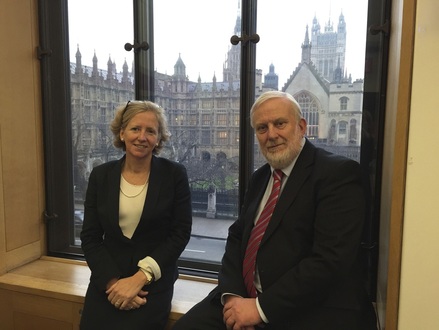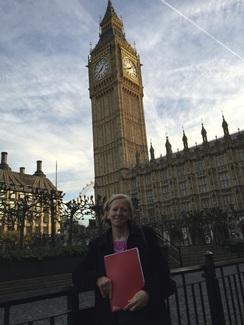
LOORG Lead Prof Sarah Coupland swapped her lab coat for legislation and spent a ‘Week in Westminster’ as part of a unique pairing scheme run by The Royal Society – the UK’s national academy of science.
Prof Coupland shadowed Mr Andrew Miller MP for Ellesmere Port and Neston at the House of Commons, to obtain a ‘behind-the-scenes’ insight into how science policy is formed, as well as an understanding of the working life of a parliamentarian.
Prof Coupland took part in seminars and panel discussions, as well as attending ‘Prime Minister’s Question’ Time and a Mock ‘Science and Technology Select Committee’ debate.
Prof Coupland said: “It has been a very interesting and informative week. It has opened my eyes to parliamentary life and helped me better understand the processes involved in creating health care policies. I am very honoured to have been selected to take part in The Royal Society’s Pairing Scheme and hope that it will help provide some input to improve research and medical care outcomes particularly in cancer patients.”
The Royal Society’s Pairing Scheme aims to build bridges between parliamentarians and some of the best scientists in the UK. It is an opportunity for parliamentarians and civil servants to become better informed about science issues and for scientists to understand how they can influence science policy.
More than 300 pairs of scientists, parliamentarians and civil servants have been partnered up since the scheme was launched in 2001.
Sir Paul Nurse, President of The Royal Society said: “We set up the Royal Society’s Pairing Scheme to provide the opportunity for MPs and scientists to build long term relationships with each other. We have now organised more than 300 pairings and have expanded the scheme to include partnerships between scientists and civil servants and members of the House of Lords.
Prof Coupland shadowed Mr Andrew Miller MP for Ellesmere Port and Neston at the House of Commons, to obtain a ‘behind-the-scenes’ insight into how science policy is formed, as well as an understanding of the working life of a parliamentarian.
Prof Coupland took part in seminars and panel discussions, as well as attending ‘Prime Minister’s Question’ Time and a Mock ‘Science and Technology Select Committee’ debate.
Prof Coupland said: “It has been a very interesting and informative week. It has opened my eyes to parliamentary life and helped me better understand the processes involved in creating health care policies. I am very honoured to have been selected to take part in The Royal Society’s Pairing Scheme and hope that it will help provide some input to improve research and medical care outcomes particularly in cancer patients.”
The Royal Society’s Pairing Scheme aims to build bridges between parliamentarians and some of the best scientists in the UK. It is an opportunity for parliamentarians and civil servants to become better informed about science issues and for scientists to understand how they can influence science policy.
More than 300 pairs of scientists, parliamentarians and civil servants have been partnered up since the scheme was launched in 2001.
Sir Paul Nurse, President of The Royal Society said: “We set up the Royal Society’s Pairing Scheme to provide the opportunity for MPs and scientists to build long term relationships with each other. We have now organised more than 300 pairings and have expanded the scheme to include partnerships between scientists and civil servants and members of the House of Lords.


